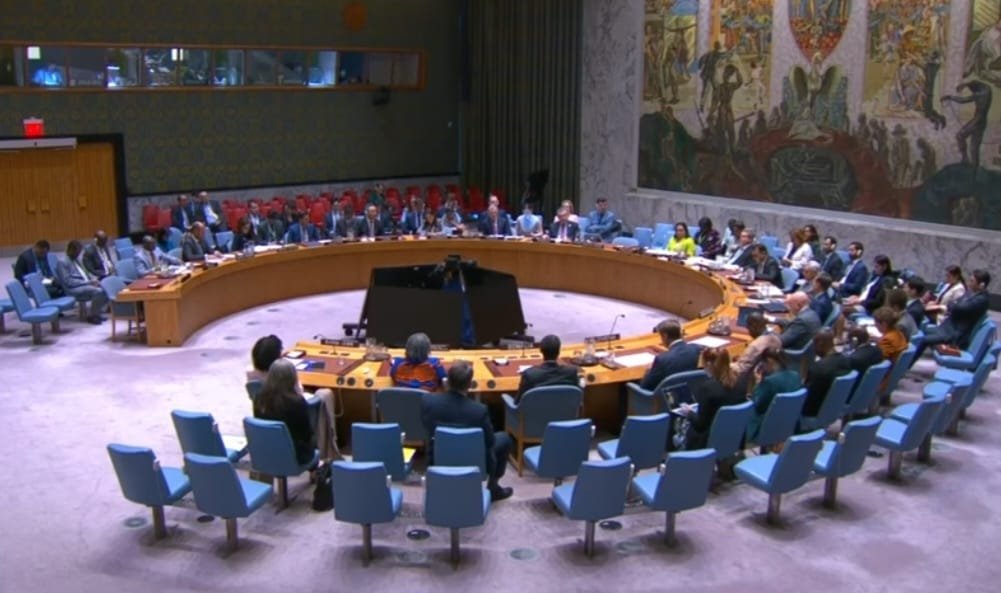New York — Sudanscope
The United Nations Security Council (UNSC) convened today to discuss the ongoing crisis in Sudan, as the conflict continues to escalate with devastating humanitarian consequences. The session included remarks from key UN officials, regional ambassadors, and Sudan’s representative, focusing on the urgent need for a ceasefire, accountability, and regional stabilization efforts.
Devastating Impact on Sudan and the Region
UN Peacekeeping Chief, Jean-Pierre Lacroix, painted a grim picture of the crisis, noting that the Sudan conflict has now spilled over into neighboring countries, particularly the Central African Republic (CAR). Lacroix reported that armed Sudanese factions, particularly those linked to the Rapid Support Forces (RSF), were responsible for an attack in CAR that killed a UN peacekeeper, further exacerbating the already fragile security situation in the region. These developments highlight the risk of broader instability in Central Africa.
“Sudan’s instability has become a regional problem,” Lacroix said. “The violence is not only devastating Sudan but is also threatening neighboring states, including CAR, South Sudan, and Chad, putting peacekeepers and civilians at further risk.”
In Sudan itself, the UN estimates that over 24,000 people have died since the conflict erupted in April 2023, with more than 13 million people displaced and millions facing extreme food insecurity, including the risk of famine. The Secretary-General, Antonio Guterres, expressed his grave concern, calling the situation a “humanitarian catastrophe” and demanding full humanitarian access to those in need.
“Sudan’s future hinges on a political resolution,” Guterres emphasized. “There is no military solution to this conflict, and those responsible for the violence must be held accountable.”
Divisive Moves by the RSF: Parallel Government Announced
The central point of tension during the UNSC session was the announcement by the RSF of the establishment of a "parallel government" in Sudan, which many see as an attempt to undermine the country's sovereignty and further fragment the state. The RSF’s move was strongly condemned by several member states.
China’s Ambassador Fu Cong called for an end to such unilateral actions, highlighting the detrimental impact this would have on Sudan’s territorial integrity and urging all parties to focus on a peaceful political solution. He also praised Sudan for keeping its borders open and facilitating humanitarian aid.
The United States Ambassador, John Kelley, condemned the RSF’s decision as a threat to Sudan’s unity, saying, “A divided Sudan is a failed Sudan. The RSF’s actions are not only destabilizing but also a direct challenge to the people’s right to self-determination.”
The United Kingdom’s Ambassador, Barbara Woodward, echoed similar concerns, urging all parties to respect Sudan’s sovereignty and territorial integrity. She also emphasized the need for the international community to hold those responsible for war crimes accountable.
Sudan’s Response: Strong Rejection of RSF’s Authority
In response to the unfolding events, Sudan’s Ambassador, Al-Harith Idriss, strongly rejected the RSF’s declaration of a parallel government. In his speech, the Sudanese representative described the move as a “blatant violation of the UN Charter and the African Union’s constitutional order.” He warned that the actions of the RSF threaten the very fabric of the nation’s unity.
“We reject any foreign interference and any actions that seek to dismantle Sudan,” Al-Harith Mohamed stated. “The sovereignty of Sudan is non-negotiable, and we will continue to pursue a resolution that respects our territorial integrity and the will of the Sudanese people.”
Sudan’s representative also underscored the need for international support in restoring peace and security, emphasizing that the international community should focus on encouraging dialogue and a lasting political solution.
Humanitarian Crisis Worsens
The humanitarian situation remains dire, with millions in urgent need of aid. The UN has reported that over 13 million people in Sudan require immediate humanitarian assistance, and more than 2.5 million people have crossed into neighboring countries. A cholera outbreak is also threatening to exacerbate an already precarious health situation.
Regional Reactions and Calls for Unity
Representatives from regional countries voiced concerns about the regional implications of the conflict. Algeria, Somalia, Sierra Leone, and Guyana issued a joint statement calling on all parties, including the RSF and Sudanese Armed Forces (SAF), to prioritize national unity over political ambitions and avoid further escalation of the conflict.
Ambassador Fu Cong of China also stressed the importance of regional actors, including the African Union (AU) and Intergovernmental Authority on Development (IGAD), in mediating peace efforts and helping to forge a unified Sudanese government.
Future Outlook and UNSC's Call for Action
The Security Council has called for an immediate ceasefire, as well as the full implementation of the Jeddah Declaration, an agreement aimed at ending hostilities and providing a framework for peace talks. However, the recent actions by the RSF have complicated peace efforts, and it is unclear whether the parties involved are willing to return to negotiations.
The UNSC reiterated its commitment to supporting Sudan’s sovereignty, territorial integrity, and national reconciliation. It has urged the international community to increase humanitarian assistance and hold accountable those responsible for atrocities and violations of international law.
The Council also stressed the importance of a broader, inclusive political process that would allow for free and fair elections and the restoration of democratic governance in Sudan. As the situation remains fluid, the Security Council will continue to monitor developments closely and remain engaged in diplomatic efforts to bring about a peaceful resolution.
The conflict in Sudan continues to present a profound humanitarian and security challenge, not just for the country itself but for the entire region. The UNSC’s latest session has highlighted the complexity of the situation, with diverging interests from the Sudanese government, the RSF, and international stakeholders. While diplomatic efforts continue, the international community is under increasing pressure to push for an immediate ceasefire and to hold accountable those responsible for the ongoing violence.
As Sudan’s ambassador emphasized, the key to peace lies in the preservation of the nation’s unity and sovereignty, even as the nation grapples with an unprecedented humanitarian disaster. The world now watches to see if diplomatic pressure can translate into a meaningful, lasting peace.


